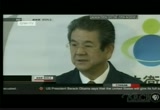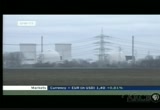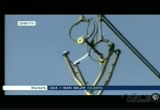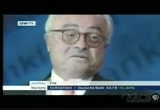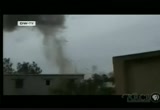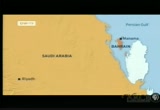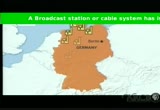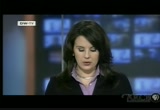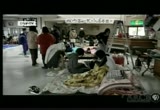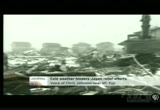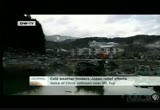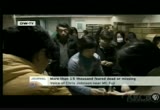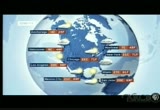tv Journal PBS March 17, 2011 6:30pm-7:00pm PDT
6:30 pm
>> hello, everyone, and welcome to the journal here on dw-tv in berlin. i'm megan lee with the news. >> i'm sarah kelly with the business news, welcome. our top stories at this hour -- in japan, the military has used wear from firefighters to cool reactors. the ieae says it has stabilized, but it could still worsen. the security council is voting on libya as the gaddafi forces push into rebel-held territory.
6:31 pm
the u.n.'s nuclear watch dog says efforts made by japan to cool reactor it's and fuel rods at the fukushima power plant have stabilized the situation but warning it could deteriorate. engineers have worked through the night to install a power line for water pumps needed to cool two reactors and a storage site for spent nuclear fuel rods. helicopters have also been dumping water on overheating reactors to stave off a meltdown. fire trucks have also joined in the effort. >> japan has been pinning a lot of its hopes on these trucks. they can get within 80 meters of the reactor. the trucks have repeatedly doused the pool with water as shown in this graphic from japanese tv. authorities were guarded about the operation's success. some reports say radiation levels have risen since it
6:32 pm
began. an airborne aspect was part of the plan. military helicopters dumped water on the facility, but worries about nuclear exposure forced the choppers to be 09 meters above the plant t to mak efforts less accurate. small steps in averting a major disaster. >> in total, there have been four such operations conducted by air with the water be funneled into the spent fool pool. >> another step is restoring electric power to the plant's cooling systems. officials said they have laid a cable, but electricity has not yet been switched on. >> once we get power supply and then we'll be able to operate a cooling system using sea water. >> out of the crisis has pushed several countries including china, germany, and israel to
6:33 pm
at least temporarily rethink their policies on atomic power. the u.n.'s atomic watch dog dispatched its director to japan as a senior official described the situation at fukushima as relatively stable. >> and to talk more about the events happening at the fukushima power plant, i'm joined in the studio now by our science correspondent, derek williams. thanks as always for being with us, derek. can you explain for us what has been done on thursday at the plant to cool down these reactors? >> well, on thursday, really a lot of what happened revolved around these pools that are inside of the secondary structure of the building where they store dispensed fuel rods. that at the moment seems to be one of the biggest dangers of a massive radioactive leak. until now, people have been worried about the reactors themselves and breaching the containment chamber and possible meltdown and explosion and now they have got it to an
6:34 pm
extent under control. we haven't heard anything in that direction in the last 24 hours or so. now people are focused on the spent fuel rods and the drarnse that they pose to the immediate environment and possibly longer term to tokyo. >> the teams at the plant are expected to have the power lines up and running again soon. what kind of effect will that have? >> that's a very positive development, actually. it's one of the reasons that everybody began to breathe out a little bit more today. if they manage to get the power up and running, then that means that theoretically at least, they could possibly turn back on the cooling systems inside of the reactors. that would go a long way towards ensuring that the now partial core meltdown that they have didn't go any further. >> ok. and aside from that, what are the next steps to try to get this situation under control? >> well, they need to keep throwi water at the buildings as they're doing now. they ndto keep trying to cool things down as much as
6:35 pm
they possibly can and they have to cool down especially these pools, the immersion pools where the spent fuel rods are. if they began to burn, if they go dry and they heat enough and they will burn. at that point, especially in reactor two and three, possibly reactor four as well because the roof is gone, you might start to get a massive contamination in the immediate environment. that's what they need to focus on next. >> we certainly don't want to see that happen. derek, as always, thanks for your assessment, derek williams, dw-tv science correspondent. well, authorities in japan are struggling to ensure reliable water and power supplies in tokyo and in areas hit by the earthquake as temperatures fall below zero in some places, nearly one million people are without heating or electricity. over 1 1/2 million people have no running water. residents of tokyo have been warned that a large-scale power
6:36 pm
outage is a possibility. train services have been reduced to conserve power and authorities have appealed to the public to ration electricity. so far, tokyo has avoided any unscheduled blackouts. ok, about what about companies that import japanese products? how are they going to cope? >> exactly. what is causing a lot of anxiety for these companies about the supply chain problems, especially here in germany. it's not just the electronic sector, companies in the engineers and optics sector have warned about delivery problems too. volkswagen, europe's biggest automaker says that it can only count on deliveries from japan until next week. it buys gearboxes that counts for production here in europe. the japanese chamber of commerce has also moved to assure customers that there is no danger of radiation from the country's products. and european stocks rebounded on thursday ahead of the g-7 finance ministers meeting
6:37 pm
called to consider the japanese crisis. steph phan wolf sent us this report from the trading from frankfort. >> after six days of straight losses, the principal of hope made the share prices, the dax went up again and closed more than 2% in positive they'rety, especially shares -- territory, especially those shares of companies are e the recommended list that suffered most from the selloff of the last few days. one of those have been the shares of siemen, here on the frankfort floor mainly because of the fact that the german government decided to shut down some nuclear plants and this is what investors are now hoping that siemans as a power plant make can make profits out of this decision. >> and european stocks rebounded on thursday ahead of the g-7 finance ministers
6:38 pm
meeting called to consider the japanese crisis. and we have a check on the numbers for you. the dax closed at 6656, just over two percentage points up. the 50 on thether hand at 2786. we go over to new york where the dow jones industrial average is trading at 11,774. the euro trading for $1.4019. with the potential nuclear power plant disaster looming in japan, the future of energy sources is one of the hot topics in germany. already seven of the country's oldest nuclear power stations are being taken off the net and at the energy exchange, the market is already responding. >> one-day hike is rare at the leipzig energy exchange. when the government announced the moratorium for seven
6:39 pm
plants, the electricity prices raced ahead. trading in electricity measured in terowatt hours has been brisk. >> total consumption including industry is 500 terowatt hours. we deal with 10% on a trading day. that increased by four over the last few trading days. >> with german atomic power stations are undergoing safety checks. if half of the plants were taken offline, the big question is where will people in germany be getting their electricity from? the answers aren't yet clear. things have simply been too volatile to make credible forecasts about a market reliant on gas, coal and renewables. >> an alternative sources of energy like solar and wind are environmentally friendly but not without challenge. it requires an extensive
6:40 pm
infrastructure which takes years and substantial investment to get off the ground. >> this wind park located 50 kilometers off germany's north sea coast has supplied the country with electricity. it's set for expanse now. but power from the turbines has to first be brought ashore and then distributed throughout the country from the northern coast all the way to southern germany if need be. that requires an extensive infrastructure. germany's fragmented power grid, however, is not designed for that kind of load. it needs streamlining and upgrading to transport large amounts of electricity. the country's energy agency says it will take years and an investment of as least 10 billion euros to complete the task. on top of that, wind and sun are subject to variations inin intensity. to insure a power supply on
6:41 pm
cloudy days, it needs storing in plants like this. there aren't enough for them for the job here yet either. >> and former deutsch bank c.e.o. will soon be in court again in a case related to, a case that was brought by a media mogul. he is accused of perjuring himself during a 2003 case brought. he sued the bank after casting doubts on objectively to pay back loans. it filed for bankruptcy when the credit lines were pulled. it was argued that the information was based on media reports. they say the bank boss has insider knowledge and is looking for billions in damages. >> megan, because to you for more news. >> the latest on libya, sarah. in new york, the security council is due to vote in the next few hours on a resolution which would impose a no-fly
6:42 pm
zone over libya, final drafts say it allows all necessary measures to protect civilians short of an invasion. the libyan defense ministry says it will retaliate against any foreign attack on its territory by hitting targets in the mediterranean. meanwhile, libyan leader muammar gaddafi says an assault on a city are imminent. his troops are pushing forward to the city. >> government troops pushed the front line ever closer to the rebel strong hold. on wednesday, the airport was bombed by the air force. the rebels brought down two of the attacking planes. there has also been fierce fighting in and around the cities in the west andnd anothe further to the east. the rebels are standing their ground, but the attackers are increasing their efforts. they have one city surrounded and continue pound the city with artillery fire. if it falls, the road will be
6:43 pm
left open. the roads leading into the city were scenes of earlier fighting. they're bringing supplies to gaddafi's troops. witnesses say 30 people were killed in the fighting here. rebel leaders have appealed once again to the international community to end the bloodshed, but world leaders haven't agreed on a course of action. meanwhile, gaddafi is already celebrating victory. he says his armies will seize the city in a number of hours and is warning rebels to expect no mercy. >> for more on the u.n. draft resolution, we can go to max hoffman who is standing by dw-tv studios in washington. max, deliberations are still continuing in the u.s. what are the details of the resolution on the table? >> well, the resolution was drafted by the british and the french and it basically calls for all measures that would protect civilians.
6:44 pm
that includes a cease-fire, end to violence, and most importantly, a ban on libyan air space excluding humanitarian flights. it excludes the use or deployment of occupational force. what it boils down to this resolution is military force focusing on a no-fly zone, but excluding occupation. >> who is in favor and who is against and do you think it will pass? >> well, it's always hard to say with the security council. there seems to be a majority for it, even a comfortable majority. that is not the question. the question is what will the veto powers do, especially here, the two countries that are most likely to use their veto, china and russia for various reasons. russia has very good relationships or had very good relationships with libya, has a lot of investment down there with the gas industry. the french diplomats who have been very aggressive pushing this resolution seem quite confident that their resolution will pass, that there will be no veto, so that would mean
6:45 pm
that probably china and russia would abstain their vote or something like that. it's, like i said, the security council, so it's not over until it's over. >> germany is being very cautious in terms of this no-fly zone over libya. why do you think that is? >> the germans have been more than cautious now. the german foreign minister says there is not going to be any german soldiers in libya including no german soldiers in a no-fly zone. the germans are cautious and hesitant when it comes into military intervention in the country. they are now in afghanistan, that's not go very well, especially with the public. they're hesitant to open up a second front. on top of that, the germans aren't convinced that a no-fly zpone would help. -- zone would help. we're not sure no-fly zone will help. what the germans are offering as an alternative is to crank up the sanctions.
6:46 pm
>> max, we thank you very much for that assessment from washington. in saudi arabia, authorities say king abdullah will be offers a number of decrees. the royal court did not say what he would say. saudi arabia is an absolute month narcy and has no parliament. dissident groups have tried to organize protests, but it's mostly been spared the unrest that has hit other arab countries. riyad sent troops to help quell protests by minority schweitz there. and police in bahrain have arstedix prominent opposition activists a day after a viable crackdown on protesters calling for political reform. the capital is relatively calm talking, but the police have stepped up their presence. on wednesday, three protesters and three police officers were killed when security personnel forcibly cleared demonstrators from the square. we'll be back after a short
6:48 pm
>> nut clear crisis in japan has prompted countries around the world to rethink their commitme to amic energy. chancellor angela merkel said in a speech that germany wants to accelerate the change to renewable energy and reach that goal as quickly as possible. she described the events in japan as a turning point for the world and she said her decision to provisionally shut down some of the country's oldest reactors was fully justified. chancellor merkel arrived prepared for a tough didn't. she defended the decision to temporarily take germany's old reactors offline. she said safety had to come first and the government's top priority was to protect the population.
6:49 pm
>> this is a precautionary measure. it's not a deal or a secret agreement or anything else. we're applying the nuclear laws in accordance with the new situation. nothing more, nothing less. that is what responsibility means. [applause] >> merkel said nuclear power must be phased out gradually. she said it made no sense to close down reactors just to buy nuclear power from abroad where safety standards are lower. germany has 17 nuclear power plants. the government has ordered the shutdown of the seven oldest for three months pending a review of safety standards. the opposition says the move is designed to deflect criticisms ahead of elections. they accuse chancellor merkel of playing down the dangers and they believe nothing will change after the moratorium. >> we don't want to just you relying on reaching a better decision in three months time than three months earlier.
6:50 pm
we want parliament to decide because it's impossible to tell how you'll feel tomorrow. >> opposition parties including the social democrats are now demanding a quicker phaseout of germany's nuclear reactors. >> back to japan now where the tsunami stricken northeast, officials have released a preliminary count of those dead or missing putting the number upwards at 15,000. now, for the half a million refugees living in shelters or out in the open, freezing temperatures are making a bad situation even worse. >> this city on the northeast coast of japan was all about swept away by the tsunami. it was once home to 23,000 people. authorities still don't know how many of them escaped harm, but the chances of finding survivors now are almost nonexistant. even so, rescue workers
6:51 pm
continue to pick their way through the ruins street by street. >> today what we're doing is searching in this one block. so far this morning, we found five bodies. >> the escape of the destruction is huge and it's difficult to imagine that this city could be built any time soon. those that have survived have lost everything. many of them have found temporary shelter in this retirement home. with more than 800 people sleeping here every night, space is limited. >> we're over capacity and they sometimes ask us to go into the mountains at night. even if you have money in your pockets, there is no use for it . >> it may not be home, but at least it's warm. outside it's cold and wet leaving many no other choice than to stay.
6:52 pm
>> so with weather in northern japan taking a turn for the worse, i asked our correspondent chris johnson how tsunami survivors were coping. >> it's very, very cold, another cold night, even colder tonight than it has been. we're talking minus six, minus three and a lot of these people are laying on the floor of a school gymnasium or they're sleeping in a tent. a lot of these people ran away from their houses on a nice friday afternoon so they had no coats or blankets with them and there is a shortage of that stuff up there. a lot of these people are saying they can't sleep at night because it's so cold. >> chris, now, there is a massive army presence in the north of japan right now. there are 100,000 troops in the areas worse affected by the earthquake and tsunami. what is their main focus? >> they're really trying to get the lifeline up and running.
6:53 pm
that's what they call it in japan. the soldiers are clearing away some of the rubble from these obliterated towns and cities trying to move the wood and the other structures and create some roads so they can get vehicles in there and start getting more and more aid to people because there are reports that food and supplies are piling up at these drop-off points up in the north, but they can't get them to the victims. so the army is trying to work on that. they are also trying to get a runway going at the airport. you might remember that that airport was completely swamped by the tsunami. there were cars and airplanes strewn all over that airport. if they can get that runway smooth, that will help in terms of getting supplies into the north. then what they got to do is get them to the more remote areas. >> now, we understand one of the emerging problems is the number of orphans, children who survived the earththake and the
6:54 pm
devastating tsunami, but have now lost their parents. >> yeah, it's a really terrible thing. a lot of these kids are, they're disoriented. they don't know how to find their parents. they're going around, you can imagine, they're going to a shelter and looking around and there is 400 people in a shelter and they're trying to see if they can find their parents or relatives. there are lists of the dead and e missing in these places, so they're going to that. some aid workers are helping them by going to databases online, but this is a real problem, just trying to sort out people, trying to link people back together with each other and the death toll and the number of people missing is at least 15,000 right now and it could very much go up. >> chris johnson, we thank you very much for that update. well, the leipzig book fair has gotten underway. serbian literature is being
6:55 pm
highlightethis year, but the situation in japan has overshadowed events. japanese comics and books about nuclear disasters are now garnering much attention. >> japanese comic book authors are usually an important part of the book fair, but the disaster forced many to cancel. that hasn't phased german publishers. >> the japanese told us, keep going, we're fighting. we have to fight our way through life, too. please don't stop distributing the books. >> visitors here can sample japanese writing and donate for the victims of the quake and tsunami. books on nuclear energy perils are popular here. one is about a woman born the year of the disaster. >> i can't believe that what happened 25 years ago has caught up with us all over again. >> writer and former leading
6:56 pm
green party politician presented her new book on war, poverty, and nuclear power. she was applauded for calling for an mediate end to nuclear power. >> smiling faces and human chains have unfortunately yet to lead to the shut down of a single atomic power station. if all of the plants in germany keep opepeting, then we're next contamination problem. >>nor the victims of the disaster in japan, the book fair has cancelled all german-japanese events. >> and that wraps up the journal at this hour. stay tuned dw-tv for more news and information. we leave you with some images from the catastrophe in japan.
230 Views
IN COLLECTIONS
KRCB (PBS) Television Archive
Television Archive  Television Archive News Search Service
Television Archive News Search Service 
Uploaded by TV Archive on

 Live Music Archive
Live Music Archive Librivox Free Audio
Librivox Free Audio Metropolitan Museum
Metropolitan Museum Cleveland Museum of Art
Cleveland Museum of Art Internet Arcade
Internet Arcade Console Living Room
Console Living Room Books to Borrow
Books to Borrow Open Library
Open Library TV News
TV News Understanding 9/11
Understanding 9/11

